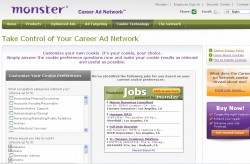 When a new tool can deliver better fitting jobs, while also offering users control over their online privacy, you have to think win-win.
When a new tool can deliver better fitting jobs, while also offering users control over their online privacy, you have to think win-win.
That’s what Monster’s updated CAN ads can do. For the first time in any of the job ad networks, and certainly rare among all behavioral advertising, online users can refine their job preferences or opt-out of the program all together.
Tom Chevalier, Monster’s product manager who lead the development team, explained that giving users more control over the advertising they see is at the leading edge of an industry trend. With more users savvy to behaviorally targeted ads, research shows they prefer them to scatter-shot ads. But there’s also an interest in controlling their preferences.
 “Users haven’t yet formed opinions on behavioral targeting,” says Chevalier. But Monster’s own survey of job seekers discovered that up to 83 percent of them want relevant job ads, targeted to them based on their behavior.
“Users haven’t yet formed opinions on behavioral targeting,” says Chevalier. But Monster’s own survey of job seekers discovered that up to 83 percent of them want relevant job ads, targeted to them based on their behavior.
So that’s what they are getting.
A bit confused by what this means? Here’s a primer:
Besides classic job postings, Monster also offers employers off-site advertising through its Career Advertising Network. It’s a collection of thousands of sites including newspaperd, Citysearch, MSN, and many more. Every visitor to those sites is “analyzed” and a relevant job is presented.
The first time a visitor encounters a CAN ad, the analysis is rudimentary; the ads they see are based on their geographic location. If they click on an ad, the type of job is now incorporated into their cookie. Over time, as they click on more and more jobs, Monster refines the targeting.
Now, those ads have an extra link: “Interest Based Ad.” Click it and the user goes to a Monster page where they can refine their preferences themselves. Or opt-out of the behavioral targeting all together, in which case they see a generic job ad.
To be sure, the wording is obscure. I don’t know that I would understand it to mean there is a way for me to control my ad preferences. On the other hand, there isn’t room in the ad for a detailed explanation. Perhaps curiosity alone will prompt visitors to click into it.
 Those who do, and choose to manage their preferences, will be rewarded by getting more precise jobs. Besides indicating geographies and occupations, users can indicate career and education level.
Those who do, and choose to manage their preferences, will be rewarded by getting more precise jobs. Besides indicating geographies and occupations, users can indicate career and education level.
I asked Chevalier if Monster had considered offering even more choices. “High levels of granularity,” he said, “tend not to give (job seekers) much more value.” Filtering too narrowly risks missing desirable opportunities, while a broad selection gets too many choices.
It’s a tough balancing act to get it, as Goldilocks might say, “just right.”